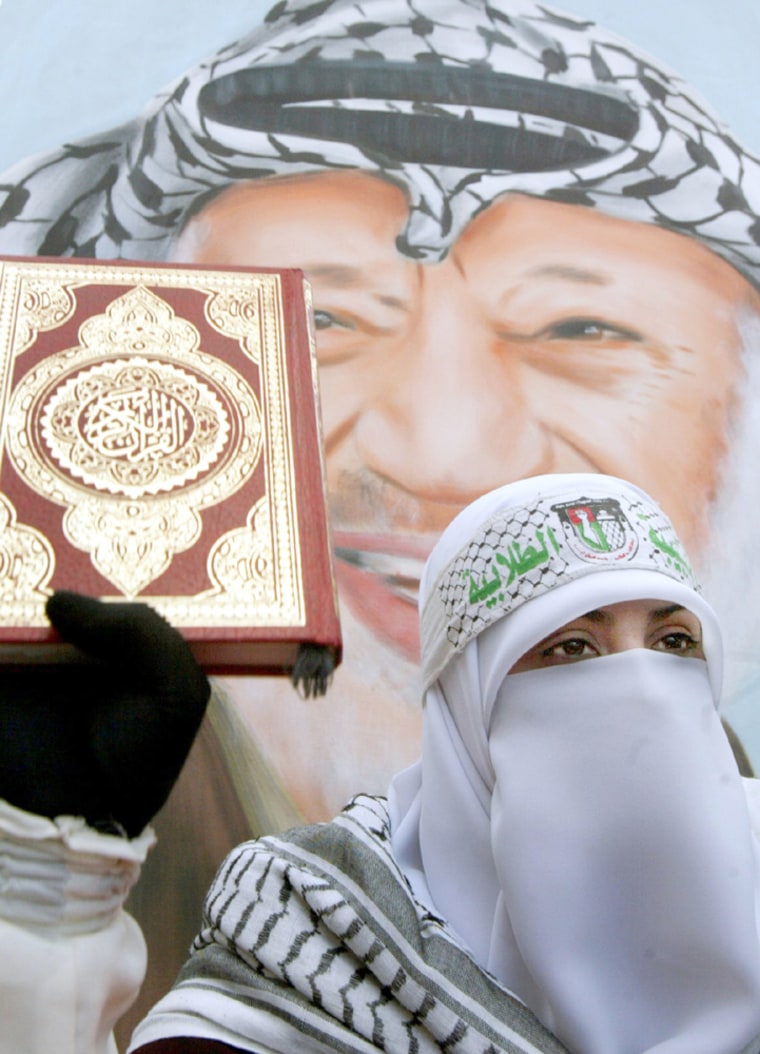A senior Hamas leader indicated Monday that the militant group is halting attacks on Israelis while the Palestinians prepare to choose a new leader, the latest sign of change following the death of Yasser Arafat.
Sheik Hassan Yousef, the group’s top leader in the West Bank, said Hamas also would consider a formal truce with Israel. Hamas has carried out dozens of suicide bombings and other attacks, killing hundreds of Israelis during four years of fighting.
Since Arafat’s death Nov. 11, there has been a sharp drop in violence. The Palestinians have turned their attention to Jan. 9 presidential elections, while Israel has curtailed its military activity and made a series of gestures meant to ensure that the vote goes smoothly.
“In the current situation, many political and militant groups have halted their attacks. They are waiting and exploring the new era,” said Yousef, who was recently released from an Israeli prison after serving a 28-month sentence.
Cease-fire possible
He also said that Hamas would consider a formal cease-fire, if Israel reciprocates. He said Israel must be prepared to release Palestinian prisoners, withdraw from occupied land and stop targeted killings of militants.
“The truce should have a price,” he said. “There is no truce from one side. The truce should be two-way. But a truce with continued Israeli aggression is not acceptable to us.”
The interim Palestinian leader, Mahmoud Abbas, has been highly critical of the armed uprising against Israel, and met with rival groups like Hamas in hopes of reaching a cease-fire. Abbas was to hold more talks with militant groups on Wednesday.
While Hamas is not fielding a candidate in the election, Yousef said the group is interested in becoming a faction within the Palestine Liberation Organization.
Abbas, the PLO chief, is the leading contender in the presidential election, according to opinion polls. Abbas appears to enjoy the tacit support of Israel and the United States.
Israeli Prime Minister Ariel Sharon has made a number of gestures to Abbas, saying that he is ready to meet the Palestinian leader and coordinate a planned pullout from the Gaza Strip next year with the Palestinians. Sharon refused to negotiate with Arafat.
Israeli military presence scaled down
Raanan Gissin, a spokesman for Sharon, said Israel has already eased its military presence in Palestinian areas to clear the way for elections.
“I think it’s very clear we have scaled down our military operations,” Gissin told The Associated Press. “We’re not conducting any initiated military operations, with the exception of those intelligence reports about ’ticking bombs’ or pending suicide attacks.”
Senior military sources, speaking on condition of anonymity, said the army is focusing only on preventing attacks and is trying to avoid operations that would create tensions with the Palestinians.
The Palestinians, for their part, have also begun to crack down on internal chaos. Prime Minister Ahmed Qureia, who heads the National Security Council, said last week that he has ordered all members of the security services to return to their units.
The Palestinians acknowledge privately that many members of the Al Aqsa Martyrs Brigades, a violent group with ties to the ruling Fatah movement, are members of the security forces who have not reported to their jobs during the past four years of fighting.
Ala’a Sanakra, an Al Aqsa leader in the West Bank city of Nablus, said the group is also considering a truce.
“We are watching the changes after Arafat’s death. We haven’t announced a truce from our side but we are exploring the future. If there is a real truce on the table, we will agree to it,” he said.
